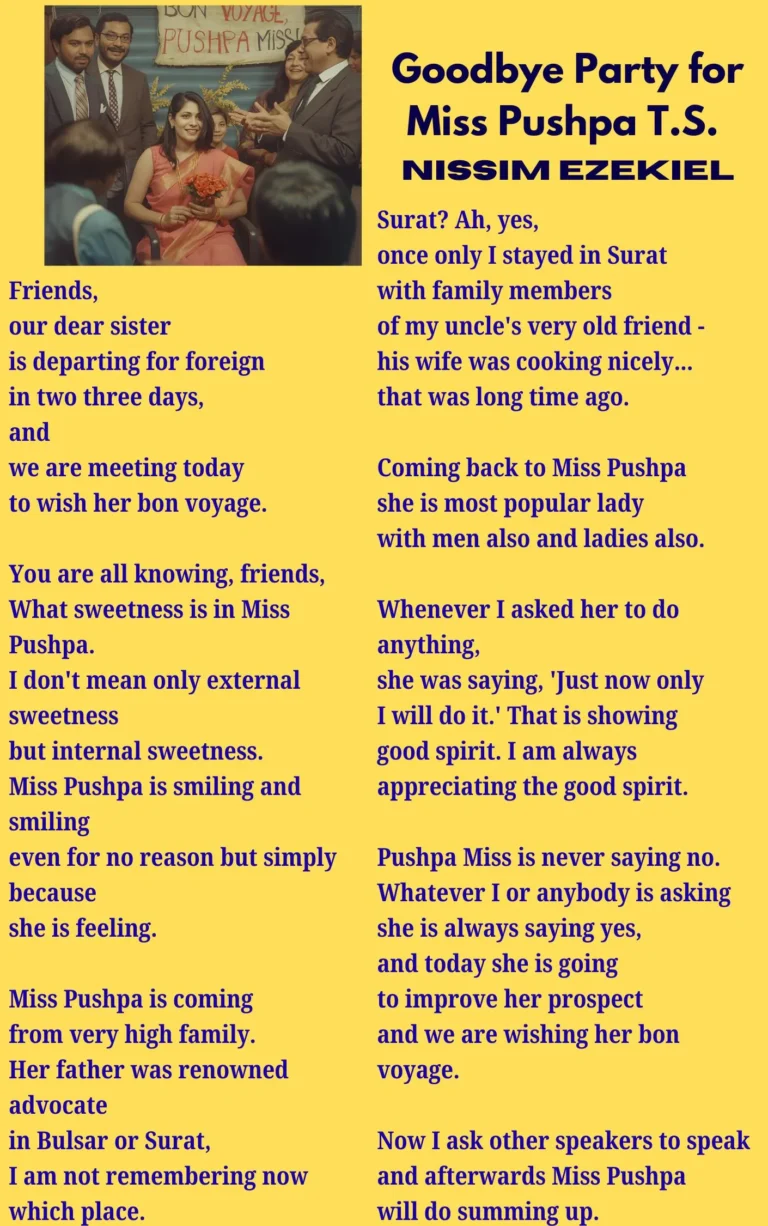Poem

Brief Biography of the Poet
Nissim Ezekiel (1924-2004) stands as one of India’s most influential English poets and a founding figure of modern Indian English poetry. Born into a Bene Israeli Jewish family in Mumbai (then Bombay), Ezekiel emerged as a multi-faceted intellectual who wore many hats throughout his distinguished career as a professor, art critic, playwright, and editor. His educational journey took him from Wilson College in Mumbai to Birkbeck College at the University of London, experiences that shaped his unique perspective on Indian society and culture.
Ezekiel’s significance in Indian literature cannot be overstated, as he was instrumental in establishing a distinctly Indian voice in English poetry. His academic career flourished as a Professor of English literature at the University of Mumbai, where he influenced generations of students and writers. Beyond poetry, his talents extended to art criticism, theatre direction, and editorial work, making him a central figure in India’s cultural landscape. His keen observations of Indian urban middle-class life earned him critical acclaim, culminating in the prestigious Sahitya Akademi Award for his poetry collection Latter-Day Psalms in 1982.
Analysis of the Poem
* Context of the Poem
* Historical and Social Background
Goodbye Party for Miss Pushpa T.S. emerged during the dynamic period of post-independence India in the 1960s and 1970s, when the country was experiencing rapid modernization and social transformation. The poem captures the essence of the educated, English-speaking Indian professional class that was becoming increasingly prominent in urban centers. This was an era when corporate culture was taking root in Indian society, bringing with it new traditions such as office farewell parties and formal workplace interactions that often felt artificial or forced.
The poem serves as a mirror to the social pretensions and cultural tensions of the time, when Indian society was actively grappling with Western influences while attempting to maintain traditional values. Ezekiel’s work reflects the complexity of this transition period, where modern professional behaviors often clashed with authentic emotional expression.
* Literary and Cultural Significance
Within the broader context of Indian English poetry, this poem represents the mature phase of the movement that sought to authentically capture Indian experiences rather than imitate Western literary traditions. Ezekiel’s characteristic style of gentle yet sharp social criticism places this work firmly within the satirical tradition, making it both entertaining and thought-provoking.
The poem’s enduring cultural significance lies in its accurate portrayal of artificial social rituals common in Indian urban professional settings, where formal politeness frequently masks genuine feelings or indifference. It serves as an important document of mid-20th century Indian social life, capturing the awkwardness and insincerity that often characterizes formal social interactions in professional environments. Through this lens, Ezekiel provides readers with a window into the evolving social dynamics of modern India, making the poem both a literary achievement and a valuable sociological observation.
* Key Themes
1. Hypocrisy and Superficiality in Social Interactions: The poem satirizes the insincere and superficial nature of social gatherings and farewell parties, where people engage in empty platitudes and performative displays of affection.
2. Cultural Differences and Societal Divides: The poem highlights the cultural and class divides in Indian society, as seen through the perspectives and interactions of the different characters.
3. Gender Roles and Societal Expectations: The portrayal of Miss Pushpa and the attitudes towards her reflect the rigid gender norms and societal expectations placed on women in the Indian context.
* Literary Devices
1. Irony: The poem is heavily ironic, with the speaker’s comments and the actual events at the party often at odds with each other, revealing the hypocrisy and insincerity of the proceedings.
2. Humor and Satire: Ezekiel employs humor and satire to critique the social customs and behaviors depicted in the poem, particularly the pretentiousness and meaningless platitudes of the partygoers.
3. Colloquial Language: The use of colloquial, conversational language, including Indian English idioms and expressions, contributes to the poem’s tone and helps to create a sense of authenticity.
* Character Analysis
1. Miss Pushpa T.S.: The central character, whose farewell party is the focus of the poem. She is portrayed as a hardworking, humble woman, but the partygoers’ attitudes and comments reveal the patriarchal and class-based biases they hold towards her.
2. The Speaker: The first-person narrator who provides a sardonic, critical commentary on the proceedings of the party and the behavior of the other characters.
3. The Partygoers: The group of individuals attending the farewell party, whose superficial and insincere remarks and actions are the target of the poem’s satire.
* Social Commentary
1. Critique of Social Hypocrisy: The poem critiques the lack of genuine emotion and sincerity in social interactions, particularly at events like farewell parties, where people engage in performative displays of affection and respect.
2. Representation of Class and Gender Divides: The poem reflects the stark class and gender divides in Indian society, as seen through the attitudes and behaviors of the partygoers towards Miss Pushpa.
3. Reflection on Cultural Norms and Customs: The poem offers a commentary on the social customs and cultural practices surrounding events like farewell parties, highlighting their performative and often meaningless nature.
Multiple Choice Questions
1. What is the primary theme explored in Goodbye Party for Miss Pushpa T.S.?
a. The importance of family bonds
b. The hypocrisy and superficiality of social interactions
c. The beauty of Indian culture
d. The struggles of the working class
2. Where did the schoolmaster live?
a) cottage
b) bunglow
c) mansion
d) apartment
3. How did the pupils view the schoolmaster?
a) silly and slow
b) soft and sassy
c) sad and shrewd
d) severe and stern
4. What did the schoolmaster love above all?
a) descipline
b) learning
c) ciphering
d) debate
5. Why is the poet sad for the schoolmaster?
a) that he is forgotten
b) that he wasn’t learning
c) that he left the village
d) that he wasn’t his student
6. Where does the schoolmaster's house stand in the poem?
a) In the middle of the village
b) Beside a straggling fence
c) Next to the church
d) Near the marketplace
7. What is notable about the blossoms on the furze near the school?
a) They are rare and fragrant.
b) They are unprofitably gay.
c) They are the pride of the village.
d) They are used for medicinal purposes.
8. How do the students react to the schoolmaster’s jokes?
a) They genuinely laugh with joy.
b) They laugh with counterfeited glee.
c) They remain silent out of fear.
d) They criticize his humour privately.
9. What emotion do the students feel when the schoolmaster frowns?
a) Dismay
b) Curiosity
c) Defiance
d) Admiration
10. What skill is the schoolmaster particularly recognized for in the village?
a) Writing poetry
b) Reading aloud
c) Arguing persuasively
d) Farming techniques
11. What amazes the villagers about the schoolmaster?
a) His strict discipline
b) His ability to measure land
c) His small head carrying so much knowledge
d) His storytelling ability
12. What is the primary reason for the schoolmaster’s stern behavior?
a) Personal dissatisfaction
b) Lack of resources in the village
c) His love for learning
d) Pressure from the villagers
13. Which of the following does the schoolmaster NOT do, according to the poem?
a) Presage tides
b) Gauge lands
c) Teach reading
d) Perform religious ceremonies
14. What happens to the fame of the schoolmaster by the end of the poem?
a) It is immortalized in the village.
b) It fades and is forgotten.
c) It spreads to nearby towns.
d) It becomes a legend passed down generations.
15. What does the poem reflect on in its closing lines?
a) The joy of education
b) The transient nature of fame
c) The challenges of rural life
d) The beauty of nature around the school
Answer the questions briefly (30-40 words)
Q1: What is the poem about?
The poem is about a farewell party for Miss Pushpa T.S. where people make fake speeches and pretend to care about her, but their words are empty and insincere.
Q2: How does the poet show that the party guests are not genuine?
The poet uses irony to show that what people say at the party sounds nice but doesn’t match their real feelings. Their compliments are shallow and meaningless.
Q3: What social problem does the poem criticize?
The poem criticizes how people behave falsely in social situations, especially how they treat women and people from different social classes with fake politeness instead of real respect.
References:
Board of editors. Literary Mindscapes I. Macmillan Publishers India Pvt. Ltd. Chennai, 2021.

